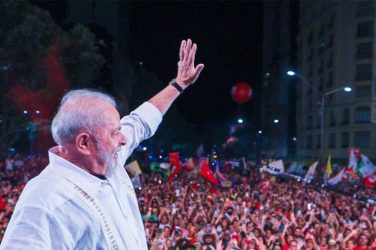Brazil’s military is getting a serious workout these days. The authorities have recently deployed it to tackle the crisis in prisons, replace striking police, and as a pre-emptive measure against another possible police strike ahead in Rio de Janeiro.
The army has, in effect, become a “parapolice” force – a substitute for the country’s badly stretched police.
Contrary to what some doom-mongering commentators say, this doesn’t signal an impending military coup, but it does show just how badly the authorities have failed to maintain public security.
Federal and state authorities who introduced severe austerity measures as Brazil entered an economic crisis have found that their cuts are starting to bite back. Just after being praised for successfully reducing spending, Espírito Santo state had to deal with a striking police force.
After more than 100 people were killed in less than one week, the state government asked federal authorities for assistance. The president, Michel Temer, reacted swiftly and authorized a Guaranteeing Law and Order (GLO) military operation, which ended up sending more than 3,000 troops to restore some measure of safety.
This was not an unusual event. Brazilians are used to the sight of soldiers patrolling their streets. In Rio de Janeiro alone, the armed forces have been deployed on at least 20 occasions since they were used to protect the UN Earth Summit in 1992.
They’ve been called in for Carnaval celebrations, Pope Francis’s 2013 visit, the 2016 Olympics and Paralympics, and the Zika outbreak. They have also regularly invaded or occupied some of the city’s favelas.
Across the country, the military frequently replaces striking police forces or other state institutions, for instance when delivering water to drought-affected citizens.
These deployments are a far cry from the military’s political interventionism in bygone years. They follow constitutional guidelines and are instigated by civilian authorities. But what’s undeniably worrying is that GLO missions have essentially been trivialized in recent years.
Austerity Bites
This is mostly thanks to state governors, who have become increasingly audacious in requesting federal support. The military openly complains about being treated as a “Posto Ipiranga”, a one-stop shop offering everything governments can’t or won’t provide themselves.
In Brazil, public security is the constitutional responsibility of state governments rather than the federal authorities. And it is at the state level that the austerity pinch is being felt: struggling to pay the wages of police officers and fearing police strikes like the ones in neighboring Espírito Santo, the governor of cash-strapped Rio asked for a “preventative” GLO operation, which would have meant deploying over 20,000 troops during the Carnaval. The military was reluctant, and the federal government only granted the state 9,000 troops.
This habit of deploying troops in non-emergency situations is a worrying one, and critics both within and outside the military fear that the armed forces are becoming political tools.
In years past, calling in the military used to be seen as an acknowledgement that state institutions are incapable of doing their job. Nowadays, federal and state governments present these operations as a way of “doing something” about the country’s public security crisis, not as a reflection of their own failures.
The excessive use of soldiers is not a good road to go down – and surprisingly enough, it has been paved by former opponents and victims of Brazil’s last military regime.
Send in the Troops
First came President Fernando Henrique Cardoso, who the military regime banned from teaching as a sociology professor. In 2001, he issued a decree allowing GLO operations in situations where a disturbance of public order can be presumed, not just where one is already happening.
His successor presidents, Luiz Inácio Lula da Silva (imprisoned during the military regime) and Dilma Rousseff (arrested for membership in a guerrilla organization and severely tortured during three years in prison) both used this legal framework to authorize the largest domestic military operations since Brazil returned to democracy.
These reached a high between 2010 and 2015 when the military occupied Rio’s Alemão and Penha neighborhoods as well as the Complexo da Maré, all as part of the Rio state government’s program of “pacification”, aimed at disrupting gangs.
The point was clearly to show the world that the authorities were serious about guaranteeing the safety of visitors during the football world cup and other mega events.
This sort of strategy might seem like a quick fix for public security problems, but it comes at a price. Politicians are cementing the military’s privileged position in Brazil’s polity and thereby increasing the armed forces’ bargaining power, allowing them to resist the federal government’s attempts to reform them.
An unpopular pension reform is a case in point: when the military took exception to being included, the head of the army published an op-ed in a major newspaper highlighting the number of state services the military provides.
Military officers have a point in claiming that the federal government would be facing enormous additional spending if soldiers were paid like ordinary civil servants. Yet it’s telling for the country’s civil-military relations that the armed forces are able to modify the government’s cuts.
Even more important is the fact that the military’s frequent deployments in issues of public security have never had more than a short-term impact on crime and violence. The army commander frankly admitted that once the troops withdrew from Rio’s Complexo da Maré, “everything returned to being just like before”.
What’s more, the armed forces’ capacities do have their limits. If there indeed was a wave of strikes by poorly paid police officers across the country, Brazil’s authorities would not be able to send troops to every corner of the country. Instead of relying increasingly on the military, it’s high time to address the fundamental problems in the law enforcement sector.
After all, the security situation is critical, with about 60,000 homicides per year, but no sustainable solution is on the horizon. What political programs do get floated often sound ambitious on paper, but ultimately end up recycling old ideas.
As long as Brazil keeps up its austerity drive, it will struggle to improve its notoriously violent, underfunded and poorly trained state police forces – and the army will remain on the streets.
Christoph Harig is a PhD Candidate at King’s Brazil Institute, King’s College London.
This article was originally published on The Conversation. Read the original article here: https://theconversation.com/brazil-is-relying-on-soldiers-instead-of-regular-police-heres-why-73034














